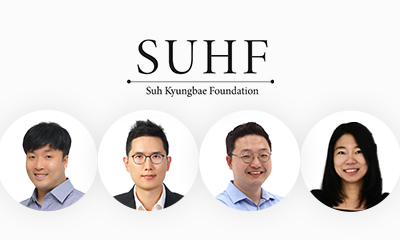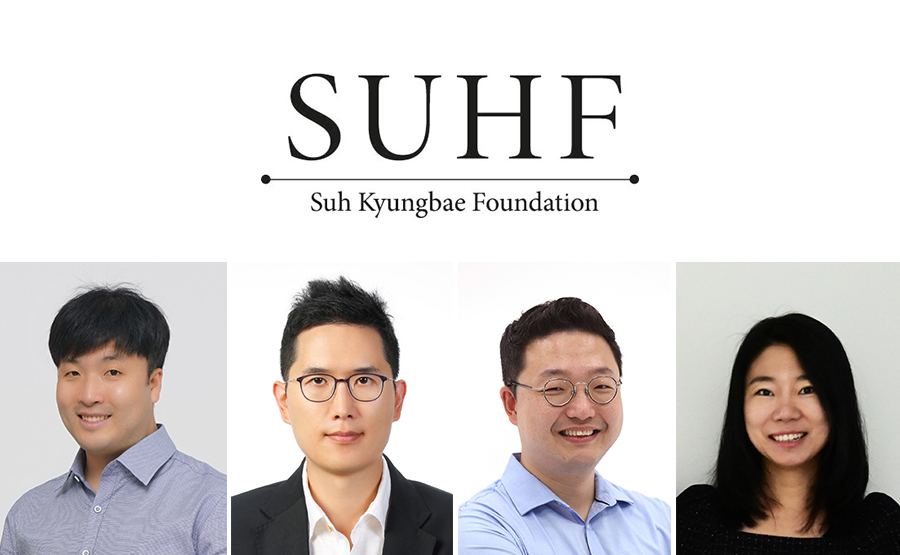

-
-
- 메일 공유
-
https://stories.amorepacific.com/en/suh-kyungbae-foundation-announces-selection-of-four-emerging-scientists-for-2023
Suh Kyungbae Foundation Announces Selection of Four Emerging Scientists for 2023

- Promoting groundbreaking research into life's mysteries, championing and supporting the next wave of scientists for a brighter future

<Featured 2023 Emerging Scientists at Suh Kyungbae Foundation, from left to right: Professor Ryu Je-kyung, Professor Park Jung-hwan, Professor Yeom Min-kyu, and Professor Lim Young-shin
(listed alphabetically in Korean).>
The Suh Kyungbae Foundation, chaired by Suh Kyungbae, is proud to announce the selection of four distinguished scientists for 2023, ensuring dedicated research support over the subsequent five-year period.
Established in 2016 with a generous endowment of 300 billion won by Chairman Suh Kyungbae of the Amorepacific Group, the Suh Kyungbae Foundation stands by the principle that “beyond the visible horizon lies an expansive universe.” This guiding ethos steers the foundation's annual commitment to bolster emerging talents in the life sciences, crafting a forward-looking vision for future generations.
Since 2017, the foundation has identified 26 visionary scientists presenting ambitious and novel research avenues. These select individuals are entrusted to break new ground in their respective domains over five years. As part of its unwavering support, the foundation commits up to 500 million won in research funding per individual, underlining the dedication to the progress of these trailblazers. Today, the cumulative investment in fostering scientific innovation stands at an impressive 70.2 billion won.
For 2023, the foundation has selected the following four scientists: ▲Professor Ryu Je-kyung of Seoul National University's Department of Physics and Astronomy, who postulates, “Is SMC-driven phase separation also a fundamental building block for chromosome organization?” ▲Professor Park Jung-hwan from Seoul National University's Department of Medical Science, driving forward the “Dissecting neural mechanisms of flexible information processing: convergent approaches spanning molecular- and systems neuroscience and computational decoding,” ▲Professor Yeom Min-kyu from the KAIST Graduate School of Medical Science, committed to “Tracing fundamental principle of tissue-specific tumorigenesis,” and ▲Professor Lim Young-shin of the University of Pennsylvania's School of Medicine, leading a pioneering study on “Investigation of the non-conventional role of CD8+ T cells in the brain.”
▲ Professor Ryu Je-kyung spearheads groundbreaking research into the Structural Maintenance of Chromosome (SMC) protein complex's universal operational mechanisms. This foundational protein complex is instrumental in intricately compacting over 2 meters of DNA into micrometer-sized chromosomes within each cell. Leveraging high-speed atomic force microscopy and single-molecule imaging, Professor Ryu is on track to elucidate the consistent functional principles of SMC proteins across diverse biological systems.
▲ Professor Park Jung-hwan is dedicated to unraveling the intricacies of the brain's ‘cognitive flexibility’ — our innate ability to adapt when faced with shifting circumstances. Through a combination of sophisticated mathematical models rooted in neural electrical signals and animal behavior experiments, he examines the transformation of neural circuits in novel situations. His work further extends to validating the molecular participants in this transformative process.
▲ Professor Yeom Min-kyu has pioneered a revolutionary technique for the sequential recording of cellular state changes directly onto the genome, coupled with the ability to visually detect these shifts in the cellular environment. By harnessing this innovative technology in cancer research, he traces the metamorphosis of standard cells into malignant entities, pinpointing the genesis of cancer's emergence.
▲ Professor Lim Young-shin advances our understanding of immune cells' pivotal role in the brain. While conventional wisdom has long maintained that the blood-brain barrier prevents circulating immune cells from breaching the brain, Professor Lim's discoveries challenge this notion, highlighting the migration of these cells to the brain even before the barrier's establishment. She is now keenly focused on substantiating her hypothesis that the brain-resident immune cells have distinct impacts on neural development compared to their circulating counterparts.
-
Like
2 -
Recommend
1 -
Thumbs up
6 -
Supporting
0 -
Want follow-up article
0


